Top 10+ HR Tech Trends Shaping HR Operations In 2026
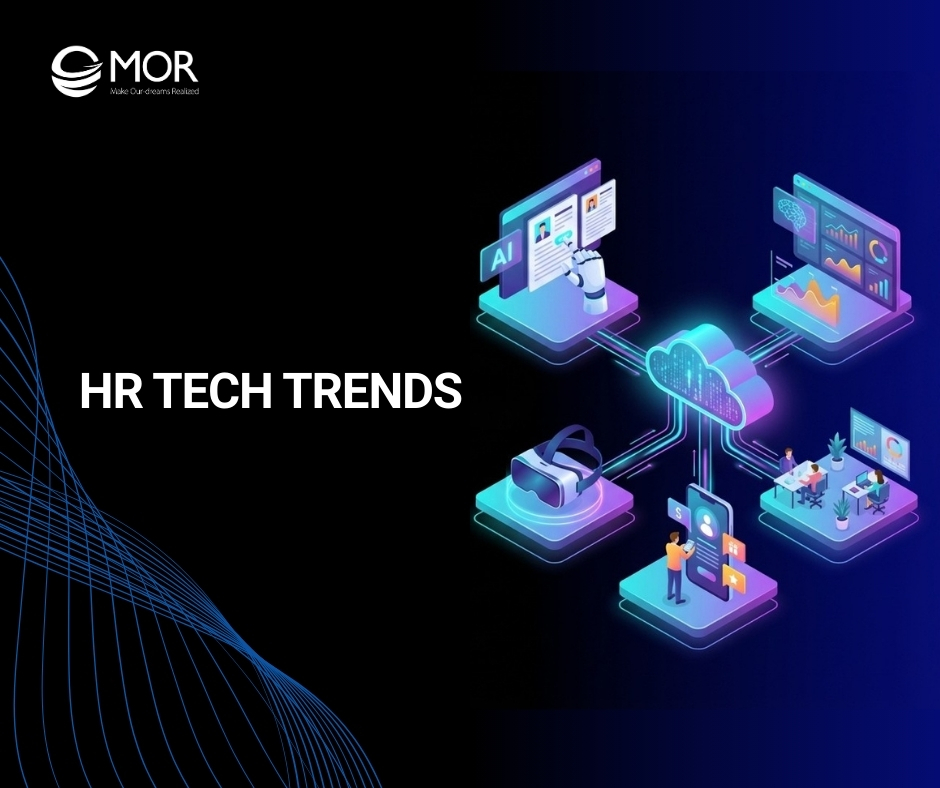
HR teams face growing pressure as systems expand, work models shift, and expectations rise. HR tech trends now shape how organizations manage people, data, and decisions across every stage of work. In this guide, MOR Software will break down the most important changes influencing HR operations, including automation, AI, and workforce platforms, so you can see what matters next and why it matters now.
What Is HR Technology?
HR technology covers the digital tools and systems that help you manage core people processes, including payroll, employee benefits administration, and applicant tracking. Today, you can choose from a wide range of HR software platforms designed to support these everyday functions.
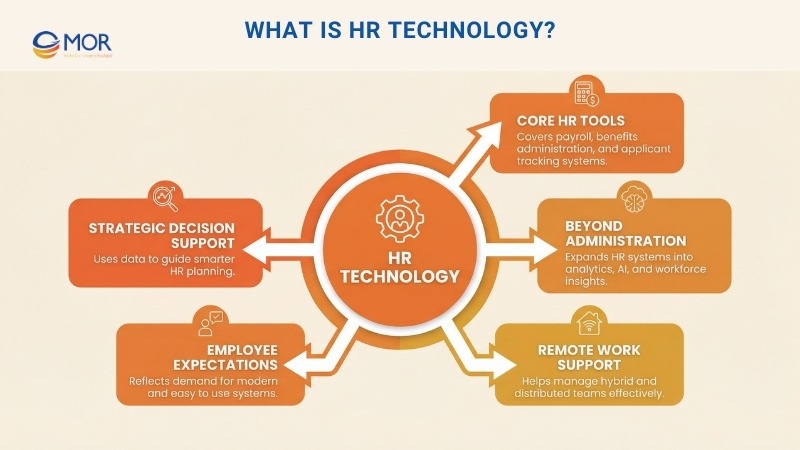
In recent years, these solutions have grown beyond basic administration. Many systems now help you manage remote and hybrid teams while using artificial intelligence and data analysis to support better decisions. This shift reflects current HR tech market trends 2025, where flexibility and insight matter more in daily HR work.
At the same time, expectations from a new generation of employees continue to rise. They expect modern, easy-to-use systems that reflect the technology and future of human resources, which is driving stronger adoption of digital tools across HR teams.
However, advice from an HR technology consultant is still worth following. You should always check whether a new solution truly fits your business needs before moving forward. With that in mind, the sections ahead explore how HR tech trends in 2026 may support HR teams and shape smarter operations.
Key Takeaways For Businesses On HR Tech Trends
- HR teams will keep testing new AI tools to simplify daily work, support clearer communication, create written content, and help limit bias. This direction reflects broader HR industry trends and ongoing learning across people operations.
- To meet the expectations of today’s workforce, integrated employee experience platforms are bringing HR systems together with tools from other departments. These platforms place employee needs at the center and provide one shared, easy-to-access environment, a shift already visible in HR tech trends 2025.
- More organizations are moving toward skills-based workforce models. This change is supported by stronger connections between HR systems and business intelligence tools, which help teams understand capabilities, gaps, and internal mobility more clearly.
11 HR Tech Trends Transforming Businesses In 2026
Let’s take a closer look at these technology shifts shaping HR trends 2026, focusing on what is already possible today and where the market is moving next.
AI Becomes Embedded Across HR Workflows
Artificial intelligence is slowly moving from science fiction into everyday work, including how you manage HR tasks.
It now feels hard to read a news article or open a newsletter without seeing AI mentioned at least once.
So how can this fast-growing area of technology support HR teams in practical ways?
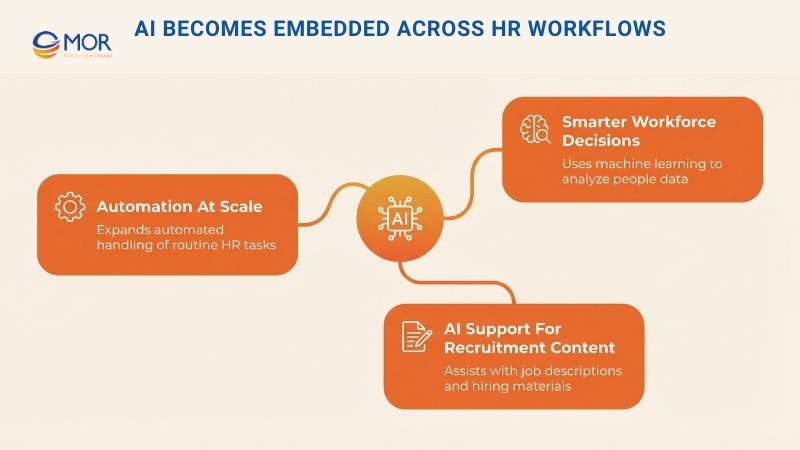
Automation At Scale
Automation at scale is built on a simple idea. If a task can run automatically, it probably should. You may already see this approach in payroll systems and routine data entry. As AI tools become more capable, the number of tasks they can handle continues to grow. This shows broader HR automation trends across HR operations.
AI chatbots, for example, can improve the employee experience by giving staff instant access to information while also sending useful data back to the HR team.
These systems can also review CVs and sort candidates based on education and experience, although careful oversight is still recommended in this area.
As AI tools continue to mature, choosing HR software with strong AI features becomes more important if you want to keep pace with ongoing changes in the workplace.
Smarter Workforce Decisions
The strength of AI also comes from machine learning, which allows systems to study and understand large volumes of data.
The more employee data you can collect, the more accurate these systems become. For this reason, many enterprise-level human resource management systems are expanding their AI capabilities to support deeper people analytics. This direction aligns with HR tech trends AI, where insight comes from patterns rather than guesswork.
Keeping track of changing HRMS features matters when you want to follow broader HR technology shifts. These updates often include AI-driven analytics, employee self-service tools, performance tracking, automated payroll processes, and compliance monitoring.
For HR teams and business leaders, machine learning helps you see where talent fits best, which programs deliver results, and whether someone may be preparing to leave the organization.
AI Support For Recruitment Content
Unless you have been completely offline, you have likely heard of ChatGPT and similar natural language tools. With a free entry plan available, this type of software can fit easily into a small business HR setup.
These tools are easy to test and work well for drafting early versions of job descriptions or writing copy used in recruitment marketing.
In hiring workflows, they can also support the creation of interview question libraries or assist you when building Boolean search strings.
A growing direction across HR tech trends, including broader HR tech AI trends, is the use of AI inside HR management software to improve recruitment and onboarding workflows.
HR Tech Trends Supporting Hybrid And Remote Workforces
Research from Zippia shows that 74% of companies already use a hybrid model or are actively moving toward one. Remote and hybrid work is no longer temporary, and it has improved work life for many people.
At the same time, these work models bring new challenges. Many organizations now look for hot desk booking systems and other office technology to reduce unused space while making better use of shared workplaces.
HR teams are responsible for managing employees across locations, time zones, and legal boundaries. They must also make sure remote staff stay healthy, engaged, and able to access HR tools and services. Connecting HR databases with newer platforms plays an important role in HR tech adoption trends across distributed teams.
In many cases, hybrid work gives HR a chance to redefine its role inside the organization. One clear direction within HR tech trends is the use of cloud-based HR platforms, which provide the flexibility and scale needed for people working from any location.
You may also decide to reduce the internal HR workload. Outsourcing HR services helps you stay compliant and organized without getting caught in daily tasks. This allows you to spend more time on planning and long-term priorities while specialists handle routine operations.
Here is how technology in human resources supports this shift.
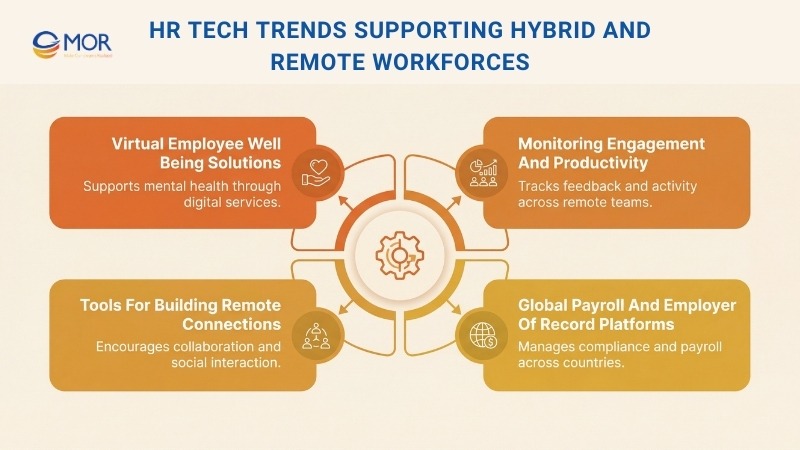
Virtual Employee Well-Being Solutions
The conditions created by the pandemic pushed employee well-being, especially mental health, further into focus for many organizations.
Because of this shift, a survey from the Business Group on Health found that in the United States, the share of large employers offering online mental health support is expected to rise to 88% this year.
The same research shows that at least half of employers plan to lower or remove costs for remote mental health services. Nearly one in five also plan to give managers extra training so they can better recognize and support employees facing mental health challenges.
Telehealth mental health services like Talkspace and BetterHelp now connect trained professionals directly with remote employees in their own homes.
Startups like Oliva focus on personalized video therapy sessions and workshops designed for managers. Some employees also show interest in AI-based therapy tools, as talking to a non-human option can feel easier and more comfortable for them.
Monitoring Engagement And Productivity
Remote work has changed how communication works. When you work remotely, you cannot walk into a nearby office to collaborate or have casual conversations with colleagues in shared spaces.
From a manager and HR point of view, it becomes harder to see what people are working on and how engaged they feel when you are not in the same location. With enterprise-level HR systems, companies can now track productivity and engagement in more structured ways, which supports ongoing HR tech trends across distributed teams.
This explains why many organizations in 2025 increasingly rely on regular pulse surveys. Tools like TinyPulse help you collect frequent employee feedback and use it to improve the overall work experience.
Alongside surveys, some organizations now use more advanced employee monitoring tools to understand how engaged people remain while working from home.
These tools collect data points like time tracking, application and website usage, and productivity levels. Some systems also include random screen captures and sentiment analysis that reviews written communication.
Data from remote employee monitoring platforms can then support healthier work habits, reduce burnout risks, highlight productivity improvements, and guide training or coaching efforts.
Tools For Building Remote Connections
While many people value the flexibility of remote work, they also say they miss office interactions, and isolation can become an issue over time.
To address this, several applications have been created to help teams form and maintain meaningful connections even when working apart.
Most HR software platforms now connect easily with messaging tools like Slack or Microsoft Teams. Popular options include Donut, Know Your Team, HeyTaco!, and Gatheround, which encourage interaction and shared moments among colleagues.
You may also choose to use region-specific solutions, such as Canadian HR software when hiring in cities like Vancouver or Toronto. This approach helps you support employees based on where they live, while considering local needs and expectations.
Global Payroll And Employer Of Record Platforms
Now that many organizations see they can continue to grow with teams that work partly or fully remotely, they are looking beyond national borders and hiring talent worldwide.
This shift has led to rapid growth in global payroll platforms and employer of record solutions that support HR teams managing distributed workforces.
Both options help you handle international employee data, run payroll across regions, and support recruitment, onboarding, and compliance needs.
HR platforms like Oyster allow you to create locally compliant contracts, clearly communicate employment terms, and keep documents centralized, secure, and easy to access.
Compliance still requires human oversight, yet hybrid global payroll solutions that combine people and technology can help you adapt to ongoing regulatory changes across different markets.
Skills-Based Workforce Models Gain Traction
Many experts we speak with are putting time and budget into building skills libraries and taxonomies with the goal of becoming skills-based organizations, a direction closely tied to broader HR tech trends shaping workforce planning.
At its core, this approach means defining the exact skills each role requires and making that information visible and accessible across the company.
Managers can use these insights to assign people to projects more accurately, while employees can rely on them to guide learning and development and support internal movement across roles.
Creating and maintaining these skill libraries takes significant effort. To manage this work, many organizations now rely on more advanced business intelligence tools to speed up skill mapping and matching.
Microsoft recently introduced Skills in Viva, a notable development in this area that draws on LinkedIn’s broad skills database to help organizations better understand and manage talent capabilities.
Cybersecurity Becomes A Core HR Tech Trend
As work becomes more digital and remote setups continue to expand, cybersecurity is becoming a larger concern for organizations.
Research from IBM shows that the average cost of a data breach in the United States reached $4.45 million in 2023, with remote work playing a direct role in that increase.
Even with rising risks, many HR professionals surveyed still view data protection as not being a serious issue.
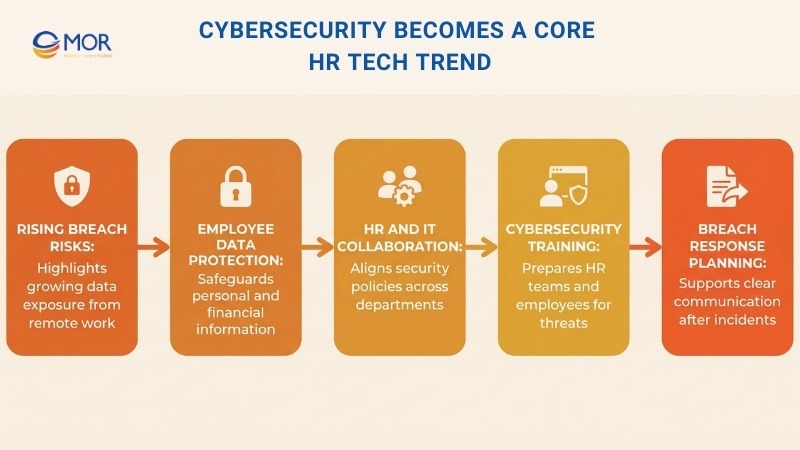
Yet HR teams should play a leading role in keeping employee and company data secure. Identity theft caused by leaked personal information can create real financial harm for employees and can also weaken talent acquisition efforts and employee retention.
HR leaders, working closely with IT teams, should define clear data security policies that guide how information is handled and protected across the organization.
HR teams also need proper cybersecurity training, and they should help extend that training to the wider workforce.
Finally, HR departments should take part in planning how the organization responds to data breaches. Employees affected by cyber incidents need clear communication and ongoing support to reduce long-term damage.
Employee Experience Platforms Consolidate HR Systems
A recent report from Josh Bersin points to the rise of a new category of employee experience software designed to meet modern workforce expectations and changing career paths. This shows how HR tech trends continue to reshape daily employee interactions.
These platforms aim to fix the problem of employees needing to switch between many systems from different departments to complete routine tasks. They replace that complexity with a single, intuitive portal that works well on mobile devices.
From an organizational view, these tools make it easier to follow individual employee journeys, including onboarding, while also giving access to data used for performance tracking and analysis.
They also include chatbots and virtual assistants that can prompt employees with reminders about key actions and deadlines.
In simple terms, this is a unified HR platform that improves the employee experience while giving organizations access to deeper and more connected people data.
Diversity, Equity, And Inclusion Technology Expands
While many viewed 2023 as a challenging year for DEI efforts, changes in workforce demographics, including an aging workforce, mean that long-term success depends on how well organizations attract, retain, and support diverse talent.
With this in mind, many companies now rely on diversity recruiting software to reach a broader range of candidates and reduce bias during hiring.
These platforms use specialized algorithms to surface more diverse talent pools. They also include features like skill matching and blind hiring, where personal details stay hidden until you decide to move a candidate forward in the interview process.
Compensation Management Tools Mature
As new regulations around pay transparency take effect and conversations about fairness and equity continue to grow, platforms like Pave have attracted strong investment in recent years.
Compensation management software supports HR teams and business leaders as they manage pay structures and address initiatives like job leveling, market benchmarking, and salary band creation.
Coaching And Mentoring Platforms Regain Focus
Strong employers support employee growth, and a range of digital tools now help make that development easier to manage. This is how HR tech trends influence learning and development priorities.
Learning management systems continue to grow more advanced. They adapt to approaches like learning in the flow of work, microlearning, personalized paths, and gamified experiences.
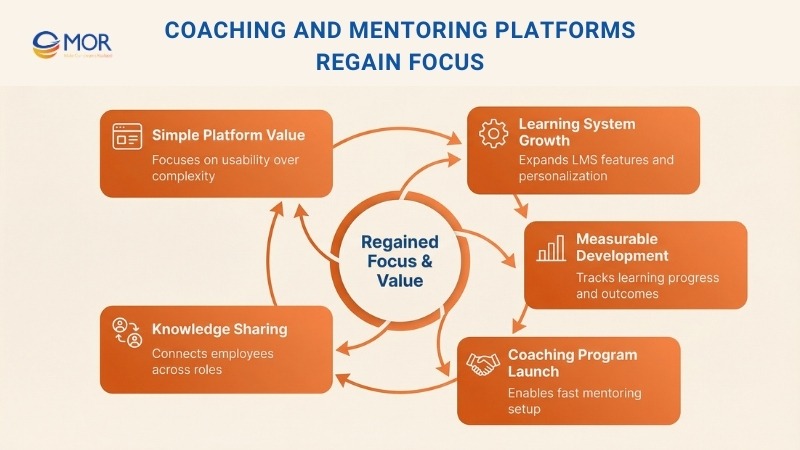
What stands out is the added focus on reporting. As learning and development becomes more structured and measurable, these systems now provide clearer data on progress and outcomes.
At the same time, coaching and mentorship software has seen increased investment.
These simple platforms allow you to launch coaching and mentoring programs quickly, helping people across the organization connect, share skills, and exchange knowledge.
Sometimes the most effective tools are not the most complex or flashy ones.
Blockchain Applications In HR Systems
Blockchain, the core technology behind cryptocurrencies, can also support business operations and HR teams in practical ways.
No, this does not mean creating an internal HR coin to reward employees for completing reviews or compliance tasks, although the idea does come up from time to time.
Beyond more creative concepts, there are several realistic ways HR teams can apply blockchain to improve daily processes.
- Credential verification: Blockchain can confirm the accuracy of a candidate’s education and work history. It creates a secure and permanent record of credentials, which lowers the risk of false claims and helps speed up hiring.
- Background checks: Blockchain can simplify background checks by storing employment history, legal records, and other key details in a clear and trusted format. This helps HR teams make better hiring decisions.
- Employee data management: Blockchain can store employee information, including personal details, performance records, and work history, in a secure system. Its decentralized structure helps protect data from unauthorized changes.
- Payroll processing: Blockchain can support payroll, especially for international teams. Using digital tokens or similar methods can lower transaction costs and reduce delays when paying employees across borders.
Internal Talent Marketplaces Take Shape
Employee turnover remains a constant challenge for organizations, and skill development continues to demand attention. At the same time, upskilling has shown clear value in supporting talent retention.
In response, many organizations now use advanced talent management systems to build internal talent marketplaces.
These connected and transparent platforms match employees with growth opportunities based on their skills, interests, and business needs.
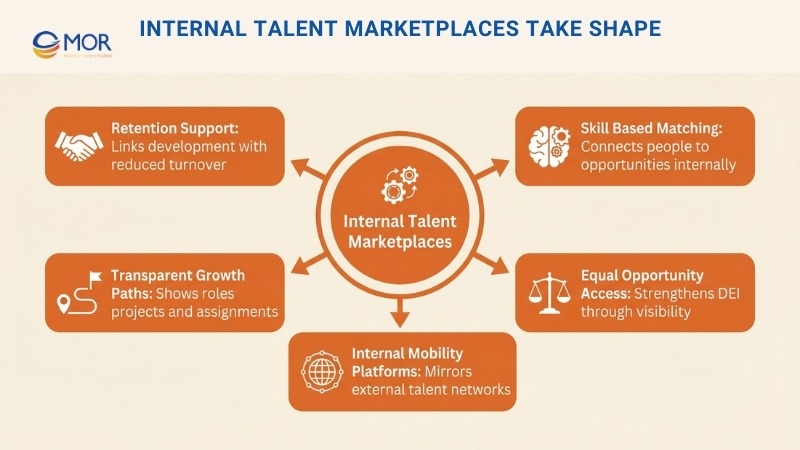
These opportunities may include a new role, a short-term project, a stretch assignment, or a mentoring relationship. You can think of these platforms as an internal version of LinkedIn designed specifically for your organization.
Beyond supporting development and retention, internal talent marketplaces also strengthen DEI efforts by giving all employees equal visibility and access to available opportunities.
Open-Source Platforms Influence HR Tech Trends
The rising interest in open source HR solutions highlights a broader move toward more flexible and scalable approaches within modern HR systems.
Open source platforms stand out because they allow deeper customization to match the specific needs of each organization. Unlike closed software, these systems help HR teams avoid vendor lock-in and adjust their HR technology stack as business requirements change over time.
In addition, open source communities often drive regular updates and shared improvements. This ongoing development helps these platforms stay current and useful as workplace needs and technology continue to change.
How Organizations Can Take Advantage Of HR Tech Trends
HR technology continues to change fast, but the purpose of HR stays consistent as HR tech trends reshape tools and priorities. When you plan system updates or platform changes, the goal remains to help people do meaningful work and support the organization in practical ways. Technology should support that mission, not distract from it.
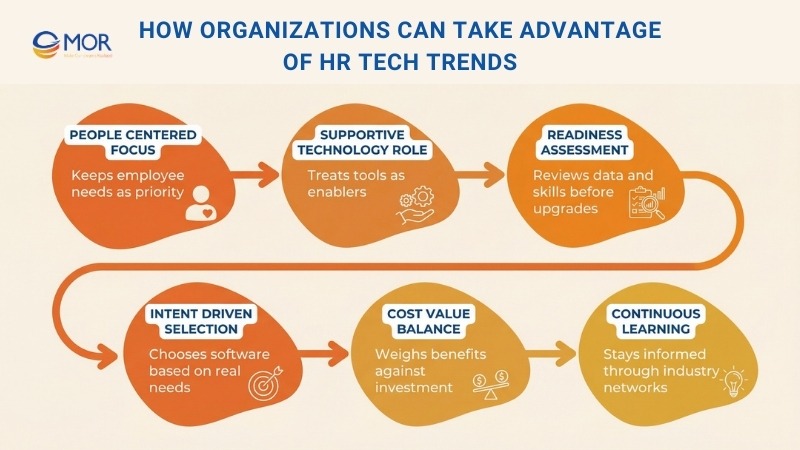
- Keep people at the center: Even as tools become more advanced, HR still exists to support employees. Systems should make work easier, clearer, and more human, not add friction or distance.
- Treat technology as a support tool: HR platforms are not quick fixes. Tools like AI only work well when your data, processes, and governance are already in place and well managed.
- Assess readiness before upgrades: Before changing systems, take time to review whether your organization is ready. This includes data quality, internal skills, and how teams will adapt to new workflows.
- Choose software with clear intent: Selecting HR software works best when tied to real needs, not trends alone. Focus on solutions that match your size, structure, and long-term plans.
- Balance cost and value: New platforms come with both benefits and expenses. Weigh software costs against productivity gains, risk reduction, and employee experience improvements.
- Stay informed and connected: Learning from peers and experts helps you make better decisions. Conferences, industry events, and trusted newsletters give you exposure to real use cases and lessons learned.
Taken together, these steps help you approach HR technology with clarity and confidence. When choices stay grounded in purpose and preparation, HR systems can support both people and performance as work continues to change. This approach also helps organizations align with the future of HR technology and long-term workforce needs.
Build Future-Ready HR Systems With MOR Software
We support companies that want to move from observing emerging HR tech trends to applying them in real HR operations. Our work focuses on building systems that fit how HR teams actually work, across payroll, HRMS, workforce planning, and employee experience.
At MOR Software, we design HR platforms around clear workflows, data accuracy, and long-term growth. AI features are added only when data readiness, compliance, and review controls are in place. This keeps automation useful instead of risky. Security and privacy are treated as baseline requirements, especially when handling payroll data, employee records, and cross-border teams.
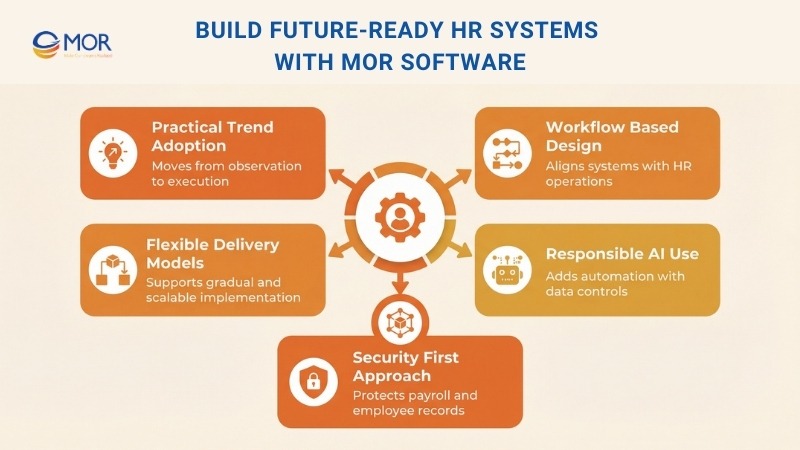
We work closely with HR, finance, and IT stakeholders to align technology decisions with daily operations. Projects often start with targeted improvements, then scale as teams gain confidence. Delivery models stay flexible, from dedicated development teams to full-cycle implementation support.
For organizations preparing for the next phase of new trends in HR, we provide structure, technical clarity, and steady execution. If you want to modernize HR systems without unnecessary complexity, contact us to discuss how MOR Software can support your HR technology roadmap.
Conclusion
HR tech trends continue to reshape how HR teams manage people, data, and daily operations. The right approach focuses on clarity, readiness, and practical execution, not tools alone. When systems align with real workflows, technology becomes a strong support for growth and compliance. If you are planning the next step in modernizing HR operations, contact us to explore how MOR Software can help turn HR technology plans into reliable, scalable solutions.
MOR SOFTWARE
Frequently Asked Questions (FAQs)
What are HR tech trends?
HR tech trends describe how technology is shaping human resources work. These trends focus on automation, analytics, employee experience, and system integration to help HR teams manage people and processes more effectively.
Why are HR tech trends important in 2026?
In 2026, HR teams manage remote work, global hiring, compliance demands, and rising employee expectations. HR tech trends help address these challenges by improving accuracy, visibility, and scalability in HR operations.
How does AI fit into current HR tech trends?
AI supports HR teams by automating repetitive tasks, analyzing workforce data, and assisting decision-making. Common use cases include payroll checks, resume screening, workforce analytics, and employee self-service tools.
Are HR tech trends only relevant to large enterprises?
No. Small and mid-sized businesses also benefit from HR tech trends. Cloud-based and modular tools allow companies to start small and expand as their needs grow.
What role does data play in HR tech trends?
Data is the foundation of most HR tech trends. Accurate and well-structured data enables reporting, analytics, AI insights, compliance tracking, and workforce planning.
Do HR tech trends replace HR professionals?
HR tech trends are designed to support HR professionals, not replace them. Technology handles routine tasks, while HR teams focus on judgment, oversight, and employee relationships.
How do HR tech trends impact payroll systems?
Payroll systems benefit through automation, real-time data syncing, error detection, and improved compliance handling. These changes reduce manual work and improve reliability.
What security risks come with HR tech trends?
HR platforms store sensitive employee information, which makes security critical. Modern HR tech trends emphasize access control, encryption, audit trails, and regulatory compliance.
How can companies begin adopting HR tech trends?
Many organizations start with targeted improvements, such as integrating systems or automating one workflow. This approach limits risk and supports gradual adoption.
How often do HR tech trends change?
HR tech trends evolve steadily, but not every trend requires immediate action. Many companies review HR technology plans annually to decide what fits their priorities.
Rate this article
0
over 5.0 based on 0 reviews
Your rating on this news:
Name
*Email
*Write your comment
*Send your comment
1